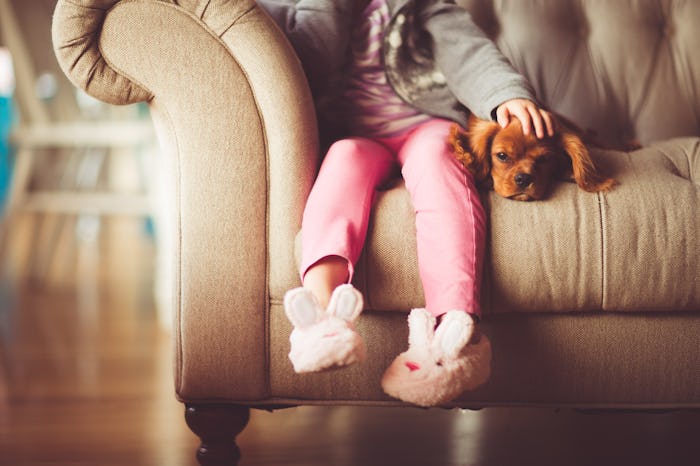Many of us grew up with pets: dogs, cats, guinea pigs, rabbits, fish — no matter who our furry friends were, they were probably a beloved part of family. In fact, they may be among the most fulfilling relationships we have throughout our lives, starting in childhood. New research shows that kids have better relationships with pets than siblings, which is probably not a surprise to anyone who grew up calling the family dog their best friend.
While there's been a good deal of research about how our relationships with pets make our lives happier, healthier, and even longer, there hasn't been a lot of investigation into how pets specifically help kids. According to the ASPCA, nearly half of households in the U.S. have a pet (cat or dog), many in homes with children. Whether we have pets before we start a family, or they join later, researchers are becoming more interested in how having a pet affects a child's development.
Researchers at the University of Cambridge talked to preteens from 77 families about their relationship to the family pet as they were growing up. The kids reported more positive emotions about their experiences with pets (citing things like comfort and companionships) than they did with siblings (where there was more conflict.)
This makes sense, of course, because pets can't talk. But the positive relationships kids had with pets was based in more than just their family dog's inability to fight over the TV remote; because pets are inherently nonjudgmental, kids felt more accepted and emotionally supported by their pets than their siblings, which may serve to improve their social skills and boost self-esteem.
The researchers also noticed that these feelings were true for boys and girls: they had expected that boys would be more likely to seek out pets as playmates, but that didn't turn out to be the case. Girls were just as likely, and in fact, they reported more feelings of companionship than boys did. While boys and girls might engage and bond with pets in different ways (playing versus cuddling, for instance) the results were pretty much the same: they forged a really meaningful relationship.
While researchers had also expected that a pet's inability to communicate in words would have posed a problem, kids actually reported that they verbally engaged with their pets about as often as they did with their siblings. And in fact, those seemingly one-sided conversations might be really good for kids because they let them articulate feelings without judgement. Talking to pets also means they're less likely to be interrupted or shutdown as they try to practice their communication skills.
Some types of pets, like cats and dogs, aren't possible for every family, but even smaller pets like hamsters and fish can be a positive experience for kids. Not only does it teach them responsibility, but as this new research shows, whether their pet is furry, scaly, fluffy, or slippery — they provide a special kind of companionship that kids will cherish their whole lives.
